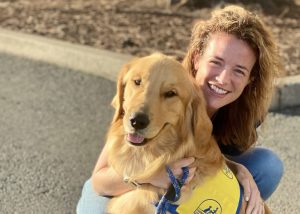 Members of the Wallis Annenberg PetSpace Leadership Institute* published a paper this week entitled “Enhancing the Selection and Performance of Working Dogs”* in the international peer-reviewed journal, Frontiers in Veterinary Science.
Members of the Wallis Annenberg PetSpace Leadership Institute* published a paper this week entitled “Enhancing the Selection and Performance of Working Dogs”* in the international peer-reviewed journal, Frontiers in Veterinary Science.
Authors – Emily Bray (University of Arizona & Canine Companions for Independence), Cynthia Otto (Penn Vet Working Dog Center), Monique Udell (Oregon State University), Nathaniel Hall (Texas Tech University), Angie Johnston (Boston College), and Evan MacLean (University of Arizona) – collaborated on the article which details recommendations for more effectively and efficiently selecting working dogs. Additionally, the authors suggest developing approaches to enhance working dogs’ performance at both the individual and population level via improvements in rearing, training, and breeding.
“Working dogs assist humans in many ways. From detecting disease in medical settings to aiding military efforts to helping people with disabilities achieve greater independence, they perform crucial tasks that affect communities every day,” said Dr. Emily Bray, Animal Behavior Postdoctoral Researcher at the Arizona Canine Cognition Center. “By optimizing the selection process and cultivating desirable characteristics via evidence-based socialization and training practices, programs can save time and money. Most importantly, focusing on these areas will also improve the welfare of both humans in need of support and the dogs that work with them.”
This article is part of a current research topic entitled “Our Canine Connection: The History, Benefits and Future of Human-Dog Interactions”* in Frontiers in Veterinary Science. Sponsored by Wallis Annenberg PetSpace, this collection aims to contribute to the current standard of understanding of human-animal interaction, suggest future directions in applied research, and consider the interdisciplinary societal implications of the findings.
Over the next few months, the papers will be individually published and then compiled into an openly available e-book accessible to everyone on Frontiers in Veterinary Science.
*Please be aware that by clicking the links to the Wallis Annenberg PetSpace Leadership Institute and Frontiers in Veterinary Science websites, you are visiting a site that is not managed by Canine Companions. Website security, accessibility and privacy policies may be different than Canine Companions policies. Please read their policies closely.
